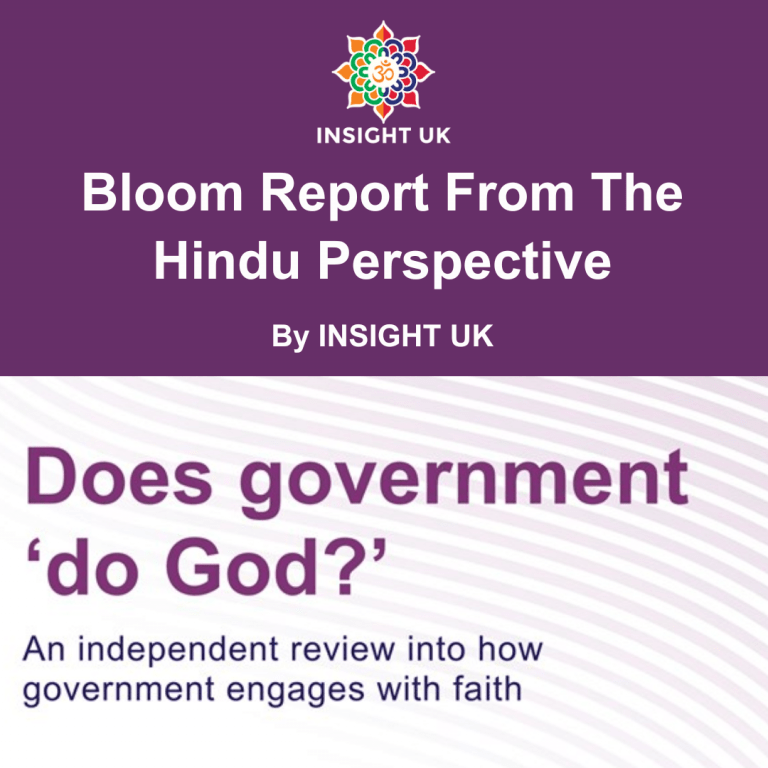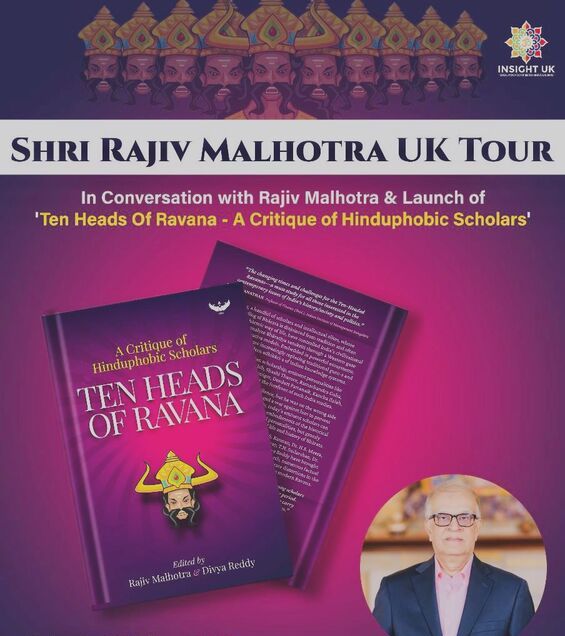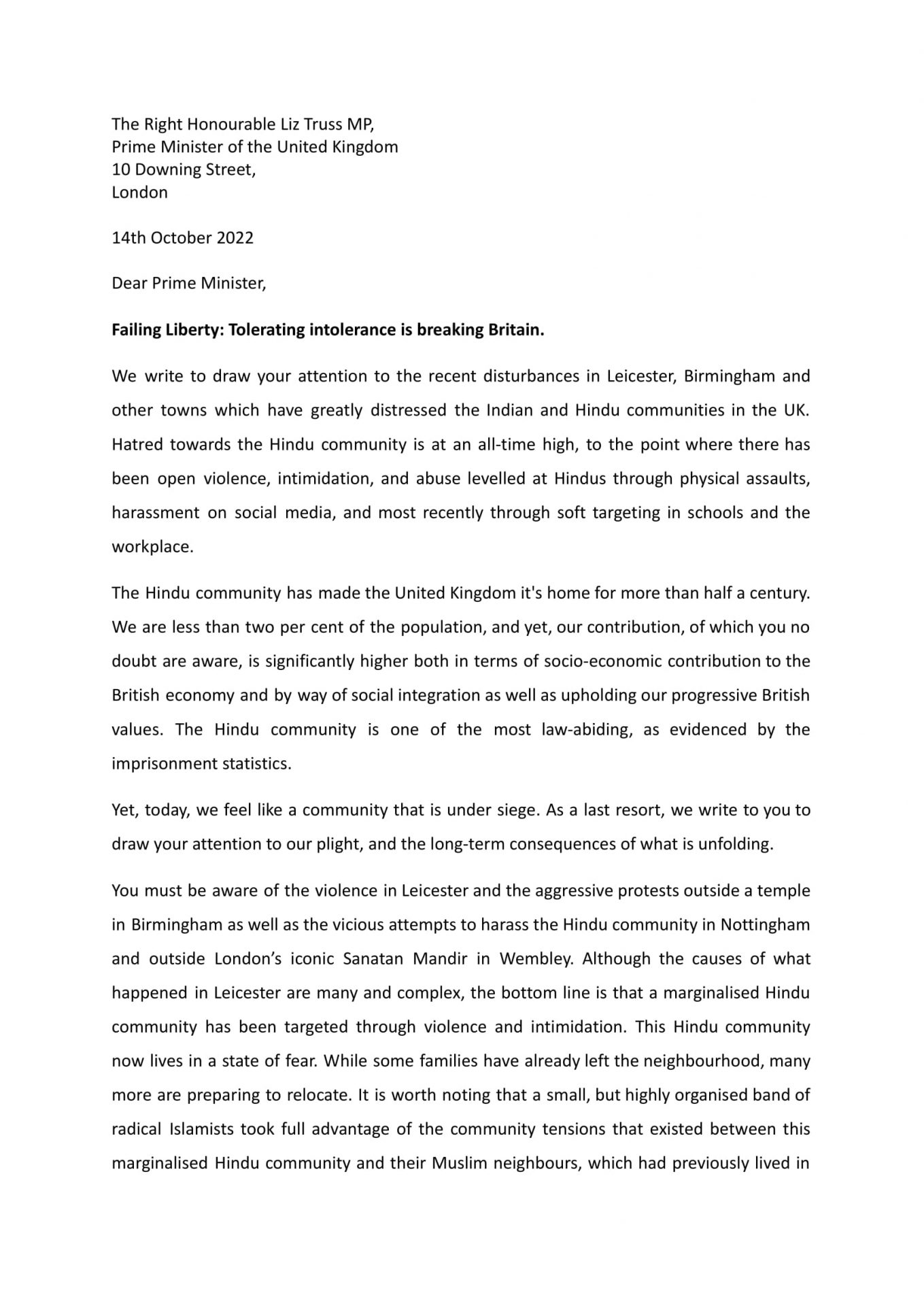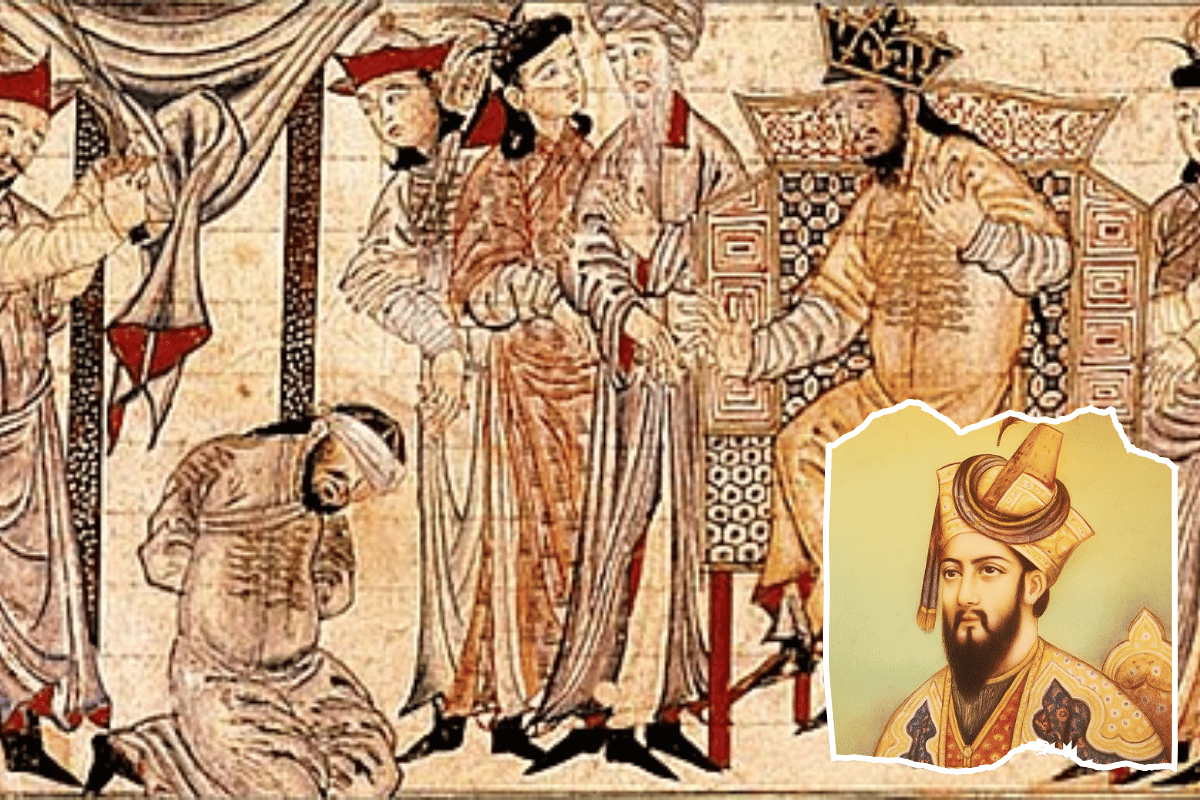
We appreciate the government’s intent behind the independent review examining how the government should engage with faith groups in England. Any such study is of great importance if the UK is to uphold its reputation as a successful, diverse, and multi-faith country, which protects its people’s rights to practise their religion, faith or beliefs.

As INSIGHT UK, a social movement of British Hindus and British Indians we broadly welcome the report though feel some issues facing the BHI have been underestimated and certain reflections about the community need re-examination for they are misinformed and misplaced.
INSIGHT UK is concerned with the rise in anti-Hindu hate as reported all across the country. The cases of attacks and vandalism of our temples are on the rise, as are incidents of grooming and conversions of our youth. It is worrisome that these anti-Hindu hate incidents are under-reported or misreported. The media bias, gaslighting of Hindu victims by systematically making false allegations against them and victim blaming is an extension of this, and aids the failure to recognise hate crimes against Hindus in this country. In this context, we feel that the report has underestimated the problem of radical Islam and its impact on religious minorities.
We are glad to see the Report identifying the presence and impact of the violent Khalistan movement in the UK, and terror groups like Babbar Khalsa whose members have been given refuge by Pakistan. The recognition of the terror tactics employed by them, such as the extreme content being posted by Khalistani extremists to silence the majority Sikh community, fueling hate towards the Hindu community and all those who do not subscribe to their violent ideology, is a first step towards eliminating this menace. The issue of Khalistan extremists disturbing peace and posing a serious threat to British Sikhs and British Hindus needs constant monitoring and immediate countermeasures.
The nature of conversions and attempts to convert British Hindus to Christianity as reported in some recent cases have included provocative messaging by aggressive missionaries. The suggestions made are that the Christian faith is the only way to receive forgiveness for one’s sins and the only way to receive eternal life. Mindful of the psychological pressure on individuals subject to such conversion attempts and resultant disharmony among families and the wider Hindu community, we urge that an impact study be conducted on this particular issue.
While we appreciate the importance of addressing extremist ideologies, we believe it is essential to approach the subject matter with accuracy and fairness. We were surprised to find the British Hindu community who have no history of association with any form of extremism, being mentioned at all in Chapter 6 of the report which deals with faith based extremism. The two paragraphs and fifteen lines highlighting ‘Hindu Nationalism’ without a shred of evidence not only seem forced but reflect misinformation, poor research and what could be best described as an attempt to monkey balance and play to a certain gallery.
It is troubling that an independent review would use terms often used by radical elements and Islamists with a history of inciting violence against the British Hindu and British Indian community. ‘Hindu Nationalism’ has been used to gaslight Hindus and especially victims of anti-Hindu hate in the UK.
India is the birthplace of Sanatan Dharma, the Hindu faith and philosophy. It is this vibrant religious culture and the extensive stretch of Hindu pilgrimage places across the length and breadth of the country that makes India a sacred geography for all Hindus. The significance of and the connection to the landscape of India for British Hindus and Hindus all over the world is deeply spiritual and beyond the notion of a modern nation state. This connection is vital for all Hindus to enhance and strengthen their spiritual practices and it promotes cultural pride and preservation. The report has grossly misread this natural attachment to what is a holy land for Hindus.
Contrary to an apt example of extremism, the bombing of Air India Flight 182 by Sikh Khalistani extremists, the report mentions ‘extreme Hindu nationalism’ but fails to provide any evidence of extremism linked to this phenomenon. The report thus draws a false equivalence between religious extremism and Hindu nationalism. The allegation is baseless and the recommendations irrelevant. It is worrying that this can perpetuate stereotypes and contribute to the marginalisation of a peaceful community. The Hindu faith is founded on principles of peace, compassion, and tolerance.
It is stated that the review is the result of consultations with thousands of faith leaders, however there is no reference to any feedback from Hindu faith leaders in the report, nor to the findings of credible independent think tanks who have studied the victimisation of Hindus in the UK. It is important to know who was consulted in relation to the UK Hindu Faith Community.
Unbelievably the report mentions two references, one a BBC story covering an interview with Majid Freeman, a known extremist and fake news peddler, and another article written by Sunny Hundal who has previously been known to have peddled fake news about the Leicester incident. Not only is this very shallow research, but is deeply problematic because a known Islamist and supporter of radical terror organisations such as ISIS and the Taliban, Majid Freeman, has been cited as a reference. Multiple independent think tanks and our own investigation revealed that Majid Freeman was actively spreading misinformation on social media about the Hindu community, potentially triggering further unrest, tension and violence against Hindus.
The other name cited is Sunny Hundal (extreme left-leaning journalist, former deputy editor for the Independent), who was one of the many others on social media stoking the flames of religious hatred by falsely equating the cricket fans as Hindus, the Hindu community, and non-existent Hindu extremists. Warnings were made on social media that violence will soon be coming from the Muslim community. Nothing against Muslims or Islam had been uttered, but the false narrative spread like wildfire
There have been reports from reputable sources that clearly demonstrate the role of Islamists and the weaponisation of social media to incite further hate against the Hindus by spreading lies. On the contrary the recent Leicester incident was proven to have no links to Hindu nationalism by both UK and international research organisations. Sharing three reports and our own investigations which establish these links and the victimisation of Hindus:
Hindu-Muslim civil unrest in Leicester: “Hindutva” and the creation of a false narrative by the Henry Jackson Society: https://henryjacksonsociety.org/publications/hindu-muslim-civil-unrest-in-leicester-hindutva-and-the-creation-of-a-false-narrative/
Cyber Social Swarming Precedes Real World Riots in Leicester: How Social Media Became a Weapon for Violence by the Network Contagion Research Institute Report (NCRI): https://networkcontagion.us/reports/11-16-22-cyber-social-swarming-precedes-real-world-riots-in-leicester-how-social-media-became-a-weapon-for-violence/?ref=quillette.com
Fact-finding report on Leicester violence 2022 by The Centre for Democracy Pluralism and Human Rights (CDPHR): https://www.cdphr.org/Report-Final.pdf
How fake news was spread to incite hate and attacks on Hindus in Leicester- https://insightuk.org/how-fake-news-was-used-to-incite-hate-and-attacks-on-hindus
We would like to emphasise the need for balanced and evidence-based reporting. It is crucial to provide accurate information to the public and policymakers, as inaccurate or biased reports can have far-reaching consequences. Such reports can lead to further stigmatisation, discrimination, and a negative impact on interfaith relations.
We kindly request that you reconsider the inclusion of Hindu nationalism as a major issue in your report unless there is compelling evidence to substantiate such claims. By doing so, you would be taking an important step towards ensuring that your report accurately reflects the realities of the current global threat landscape.
We request a meeting with you to discuss at length the Hindu community’s concerns. Thank you for your attention to this matter. We trust that you will give due consideration to the issues raised and our requests. We look forward to hearing from you.









